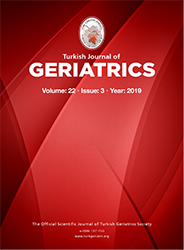2Middle East Technical University, Informatics Institute, Health Informatics, Ankara, Turkey DOI : 10.31086/tjgeri.2019.114 Introduction: Interval timing requires cognitive resources such as attention, long-term memory, and working memory. Unfortunately, these functions deteriorate with aging. Changes in time perception are reported in healthy aging, in addition to several different neuropsychiatric disorders. Although age-related changes in time perception have been amply described in the literature, the actual underlying mechanisms remain controversial.
Materials and Method: This study included a total of 33 young (mean age = 23.31 years) and 33 old (mean age = 67.63 years) individuals who performed a time bisection task with a range of 1.25-2.5 seconds. The experimental design was strictly controlled to minimize the effects of age-related declines in cognitive functions. An additional psychometric measurement related to the subjective passage of time was also assessed.
Results: A Mann-Whitney U test was conducted with the bisection point, Weber ratio, and difference limen as the dependent variables. The young and old participants showed similar time bisection performances (p ? 0.05). However, the verbal expression of the subjects indicated that time generally passes faster for old individuals whereas old participants expected the next hour to pass slower for them than did their younger counterparts (p ? 0.05).
Conclusion: It was demonstrated that the perception of time is preserved with aging in the supra-second range when cognitive demands are minimized by reducing task complexity.
Keywords : Aging; Time perception
